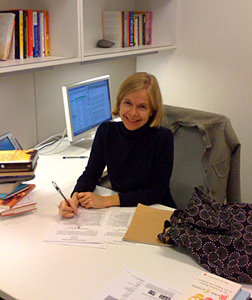Freaky Fortnight
The results of my housework equality quiz.
Generally on the subway in the morning, I look at e-mail on my phone. I already know this is one of the things I'm going to miss about office life. The time-and-date stamps on the notes offer a sense of Slate colleagues waking up all over the country—Cincinnati; Arlington, Va.; Brooklyn, N.Y.—and greeting the day with e-mail pings. Most of these people I haven't even met, but staring at my inbox is like holding friends in the palm of my hand. When I start to feel like a self-important jerk scrolling up and down the screen, I put the phone away and take out a book. Because of this project, it's usually something about motherhood.
In pretty much every book or essay or blog entry about motherhood I've ever read, the author takes a look back at her own childhood and lets you know whether her own parents fulfilled or defied gender stereotypes. A common shorthand is whether Free To Be You and Me was the soundtrack of your car rides or not. (My family had it, but we preferred Annie; Mike's family had never heard of Free To Be until this summer, when we downloaded it for Nick.) Here's my time-machine section, in the form of an exchange between me, my mother, and my father that was recorded when I was 4 and a half:
The key part of the exchange:
Q: What do mommies do?
A: Wash clothes. Take care of little children.
Q: What do daddies do?
A: Tickle.
What can be gleaned from this recording? That, as a preschooler, I perceived my mother as a caregiver and a doer of domestic chores; that I saw my father as the silly one, the roughhouser. How accurate was my perception? At this point in my life, my mother was a stay-at-home parent, and my father was the news director of a local radio station—and a giver of two kinds of piggyback rides, regular and tippy.
But families change; this is a snapshot of a single moment. Later, my father quit his job at the radio station and was home for a time working on a novel; later still, he went to work at a big corporation. My mother became a Montessori school teacher. I guess if there's anything my family taught me, it's that professional roles are not fixed but fluid.
When I tried to replicate this interview with Nick this morning—building on yesterday's effort—he offered an enticing hook: When he grows up, he wants to be a race-car driver. But as I continued—self-consciously, in a version of my father's authoritative reporter voice—Nick made a face and said, "That sounds fakey."
As for the division of domestic labor in my family, that's one thing I can't imagine replicating. My mother shined my father's shoes and folded his handkerchiefs. By contrast, Mike and I have a perfect egalitarian marriage. Wait, that sounds fakey! Are we really doing everything even-steven?
These days there's a way to find out. The equally shared parenting movement encourages you to keep track of who does what. Parents record the time spent on domestic tasks with the precision of lawyers recording billable hours. When I read the big story about equally shared parenting in the New York Times Magazine, I thought the people who did it were nuts. At the same time, as someone who used to record items such as "$0.01: penny found in futon" on Quicken, I understood the impulse. So this afternoon at the office, while waiting for a writer's review of Where the Wild Things Are, I took two of the quizzes that help you and your spouse determine your "Equality Scale." (Taking such quizzes is another trope of the literature of mommy-hood; Ayelet Waldman mentions both Free to Be You and Me and equal parenting in a single chapter of her book Bad Mother.)
I took the quizzes as my old self, not my swapped self. One was designed to rate our "housework equality," the other our "childraising equality." The results show that I do more childraising; on housework, Mike and I came out even. I suppose we're providing a good model: Nick sees Mike do dishes. But what model am I providing? Sometimes I wonder whether I'd be making different choices if I had a girl. Perhaps I'd feel compelled to work 70-hour weeks just to show her that she could—or just so that when she grew up, she wouldn't look back on my choices and think that I'd been brainwashed by my generation's cult of overinvolved child-rearing. Someday my choices may seem as retro as shoeshine and handkerchiefs.
